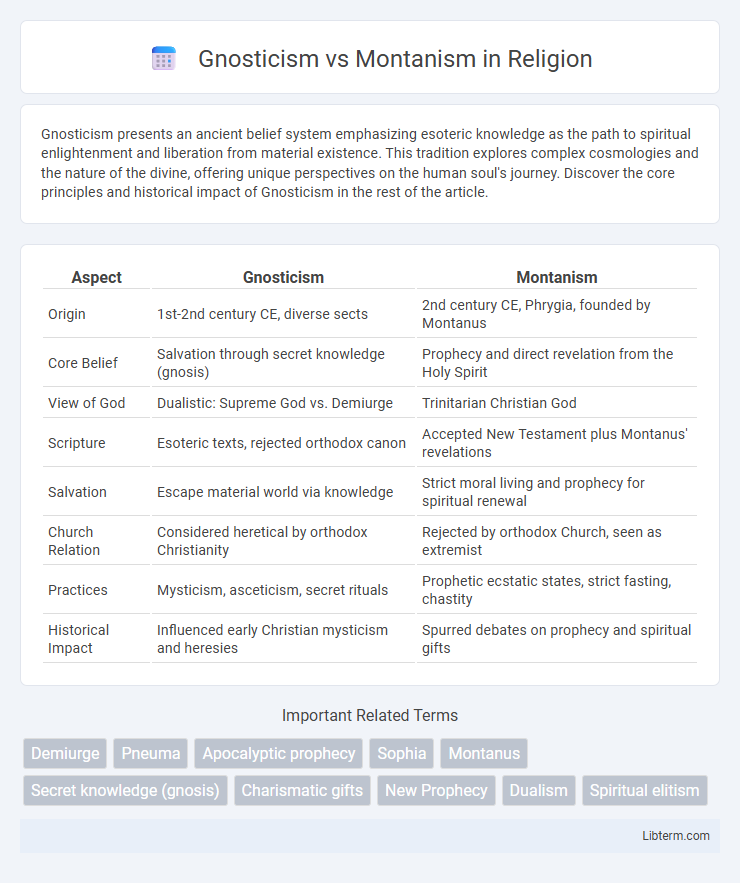Gnosticism presents an ancient belief system emphasizing esoteric knowledge as the path to spiritual enlightenment and liberation from material existence. This tradition explores complex cosmologies and the nature of the divine, offering unique perspectives on the human soul's journey. Discover the core principles and historical impact of Gnosticism in the rest of the article.
Table of Comparison
| Aspect | Gnosticism | Montanism |
|---|---|---|
| Origin | 1st-2nd century CE, diverse sects | 2nd century CE, Phrygia, founded by Montanus |
| Core Belief | Salvation through secret knowledge (gnosis) | Prophecy and direct revelation from the Holy Spirit |
| View of God | Dualistic: Supreme God vs. Demiurge | Trinitarian Christian God |
| Scripture | Esoteric texts, rejected orthodox canon | Accepted New Testament plus Montanus' revelations |
| Salvation | Escape material world via knowledge | Strict moral living and prophecy for spiritual renewal |
| Church Relation | Considered heretical by orthodox Christianity | Rejected by orthodox Church, seen as extremist |
| Practices | Mysticism, asceticism, secret rituals | Prophetic ecstatic states, strict fasting, chastity |
| Historical Impact | Influenced early Christian mysticism and heresies | Spurred debates on prophecy and spiritual gifts |
Introduction to Gnosticism and Montanism
Gnosticism is an ancient religious movement emphasizing esoteric knowledge (gnosis) as the path to spiritual enlightenment and salvation, often portraying the material world as flawed or evil. Montanism, emerging in the 2nd century CE, is an early Christian prophetic movement centered on new revelations through the prophets Montanus, Maximilla, and Priscilla, advocating strict moral rigor and expecting an imminent apocalypse. Both movements challenged mainstream early Christianity by introducing alternative spiritual teachings and practices, influencing theological debates and church authority.
Historical Origins and Development
Gnosticism emerged in the 1st and 2nd centuries AD, rooted in diverse religious traditions such as Hellenistic Judaism, Christianity, and pagan philosophies, emphasizing esoteric knowledge (gnosis) for spiritual salvation. Montanism began in the late 2nd century AD in Phrygia, founded by Montanus, who claimed prophetic revelations and advocated for a charismatic, ascetic Christian community awaiting the imminent New Jerusalem. Both movements represent early Christian heterodoxies but diverge significantly in theology and practice: Gnosticism centers on dualistic salvation knowledge, while Montanism focuses on prophetic authority and rigorous moral discipline.
Core Beliefs of Gnosticism
Gnosticism centers on the belief in esoteric knowledge (gnosis) as the path to spiritual salvation, emphasizing the dualism between the material world, viewed as corrupt or illusory, and the divine realm of light and spirit. It asserts that the soul's liberation from the physical body is achieved through awakening to hidden truths imparted by a divine spark within, contrasting sharply with orthodox Christian teachings. Montanism, by contrast, emphasizes charismatic prophecy and strict moral rigor, while Gnosticism prioritizes mystical knowledge and metaphysical insight as core to faith and redemption.
Key Tenets of Montanism
Montanism emphasized new prophetic revelations and strict moral rigor, contrasting with Gnosticism's focus on esoteric knowledge and dualism. Montanist key tenets include the belief in ongoing prophecy through the Holy Spirit, an imminent expectation of the New Jerusalem, and ascetic practices such as fasting and celibacy. This movement prioritized charismatic authority and ethical purity, shaping early Christian debates about prophecy and discipline.
Major Figures and Founders
Gnosticism, emerged in the 1st and 2nd centuries CE, features major figures like Valentinus and Basilides who focused on esoteric knowledge (gnosis) as the path to salvation. Montanism, founded by Montanus in the late 2nd century, emphasized prophetic revelation and the imminent New Jerusalem, with prominent leaders including Montanus and prophetesses Priscilla and Maximilla. The contrasting founders highlight Gnosticism's secret wisdom versus Montanism's ecstatic prophecy within early Christian heterodox movements.
Views on Scripture and Revelation
Gnosticism views scripture as encoded with hidden, esoteric knowledge accessible only to an enlightened few, emphasizing personal, mystical revelation over established texts. Montanism champions ongoing prophetic revelation through the Holy Spirit, asserting that new, authoritative revelations can supersede traditional scripture. Both movements challenge orthodox Christian views by prioritizing direct spiritual insight over the fixed biblical canon.
Attitudes Toward the Church and Authority
Gnosticism rejected the institutional church's authority, emphasizing secret knowledge (gnosis) as the true path to salvation and often viewing the material church as corrupt or irrelevant. Montanism, while recognizing the church's authority, challenged its established hierarchy by promoting new prophetic revelations and a stricter moral discipline, insisting that the Holy Spirit continued to speak directly through their prophets. Both movements caused significant tensions within early Christianity by questioning traditional ecclesiastical structures and doctrinal control.
Influence on Early Christian Communities
Gnosticism significantly influenced early Christian communities by introducing dualistic beliefs that contrasted material and spiritual worlds, prompting debates on salvation and scripture interpretation. Montanism impacted these communities by emphasizing prophetic revelations and strict moral discipline, challenging established ecclesiastical authority and encouraging charismatic expressions of faith. Both movements shaped doctrinal boundaries and prompted the early Church to define orthodoxy more clearly.
Criticisms and Controversies
Gnosticism faced criticism for its dualistic worldview and secretive knowledge claims, which many early Christians viewed as heretical and undermining orthodox salvation doctrines. Montanism sparked controversy due to its prophetic extravagance and rigorous moral standards, challenging established church authority and causing divisions within Christian communities. Both movements were condemned by orthodox leaders for threatening ecclesiastical unity and doctrinal purity in the early Christian church.
Enduring Legacy and Modern Perspectives
Gnosticism's enduring legacy lies in its dualistic worldview and emphasis on esoteric knowledge, influencing modern spiritual movements and contemporary interpretations of Christianity and mysticism. Montanism, with its prophetic zeal and focus on ecstatic revelation, contributed to early Christian understandings of prophecy and charismatic expressions, impacting later Pentecostal and charismatic traditions. Modern perspectives analyze Gnosticism as a complex, symbolic system challenging orthodox narratives, while Montanism is studied for its role in shaping early ecclesiastical authority and the dynamics of spiritual experience.
Gnosticism Infographic

 libterm.com
libterm.com